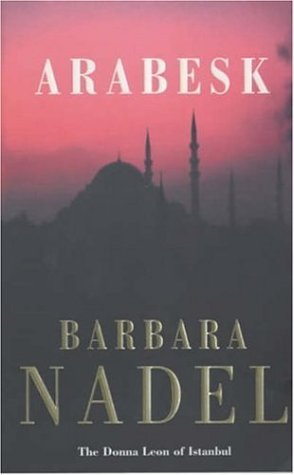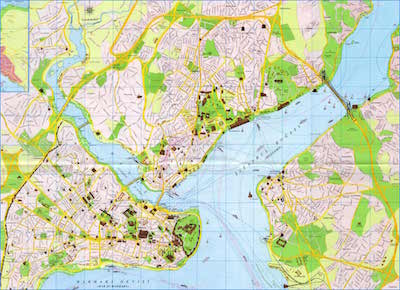This is the third entry in this long running krimie series set in contemporary Turkey. The title refers to a style of popular music that seems to parallel country and western music, and not the elaborate decorative style known as arabesque. There are fifteen novels in all and I have read four or five others.

The protagonist is Inspector Çetin Ikman and his homicide team in Istanbul. In this entry the earth moves, more than once, but only in slight tremors as Europe and Asia once again collide at the Bosporous, as one of the characters observes.
Some of the cleavages of Turkish society are mirrored in the story, West (urban, rich, and European) vs. East (rural, poor, Asian), religious (Muslim, Jew, Yezidi, Christian), social (wealthy and servant), and ethnic, too, Turks, Ottomans, Kurds, and an expatriate. The distinction between Turk and Ottoman has to do with social status but their is also an ethnic patina to it, it seems, the Ottomans are taller, lighter of skin, etc. than the Turks. The expatriate is a half-Irish doctor who likes the life in Turkey but not the way women are treated, and that is another cleavage in the story. Men go out and about, and women stay home in the kitchen.

Nadel’s krimies are guide books to Turkish society with a plot that brings together the individuals who embody these lines of demarcation. To say it that way makes them sound didactic and that is not the case. The books are lively and walks through the streets are vibrant, exotic, and sometimes frightening.
Always in the background for young men of draft age is Turkey’s continuous conflicts along the Iraq and Syrian borders and in Cyprus. These conflicts may be low level but conscripts get killed in them every day. Everyone knows this happens but the Turkish news media seldom reports these events.

In this entry Ikman is on sick leave but sitting at home doing nothing is depressing so he gradually insinuates himself into an investigation led by his subordinate, the tall, urbane, handsome, Ottoman, Mehmet Süleyman. In contrast, Ikman is short and dark, and very Turkish. Worse, Ikman is half-Albanian, a cross that he never escapes.
 Barbara Nadel
Barbara Nadel
Sometimes the stew is too rich for this reader. No doubt the names are all authentic but, as in those 19th Century Russian novels where everyone has three names, I found it hard to distinguish and remember all the names that come up in the early chapters. The references to the different quarters of Istanbul mean nothing to me, but I should have the wit to find a map to follow the action. Everyone smokes, more or less continuously.
Arabesque evolved, says fount Wikipedia, to interest the eye while not depicting human or animal forms, respecting Allah’s power of creation and destruction of these beings.
Skip to content
